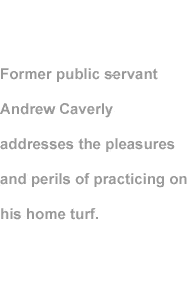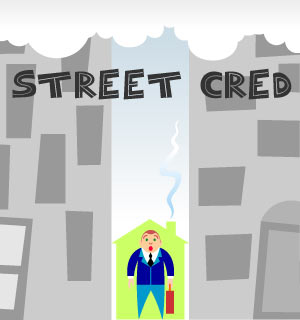 |
|
||||||||||||

|

|
|
By Doug Banks
|
When you think of big time Boston lawyers, what names pop to mind? Ally McBeal? Bobby Donnell? Alan Dershowitz? How about Andrew Caverly? You've heard about Andrew Caverly, right? If you're a) an attorney based in Boston; b) a reader of New England newspapers; or c) a member of his immediate family, then you'll need no introduction. On the other hand, it's possible that a) you're none of the above; b) you don't know who the hell Andrew Caverly is; and c) you're starting to get a little bit annoyed. In any case, sit tight: here comes a quick primer on the man. For those of you who already know him, don't worry -- it'll only take a second. A Brief History of Andrew Caverly Unlike most of the freelancers 1099 profiles, Andrew Caverly was, in a former life, a semi-famous wage slave. Once upon a time, y'see, he was an extremely public public servant: the head of the Boston branch of the Federal Trade Commission (FTC). Then, this past July, when the Beantown agency closed down, he opened up a practice of his own in suburban Andover, Mass. Today the new kid on the block is trying to transform himself into the king of the hill. Goodbye State Street, Hello... Whiffletree Circle? Initially, Caverly worried about his new business address, which happens to be his home address as well. He remembers anxiously watching his printer spit it out on 200 announcements informing law firms, former colleagues, newspapers, and prospective clients of his infant business venture. It concerned him because a lawyer's address instantly suggests something about his credibility. (As with most IPs, credibility is one of the most important issues to Caverly.) Legal letterhead always looks better if it says State Street in Boston or Wall Street in New York City. The address of Andrew Caverly's solo law firm? 4 Whiffletree Circle. Caverly himself says: "It's a funny name for a street. But having a post office box is not necessarily any better. Federal Express won't deliver to a post office box, for one thing. Having a home office is not something I want to advertise, but it's not something I'm trying to hide. I agree it's not the ideal address, but I'm not trying to hide it."
IP Help Of course he had no need to hide it: in his highly specialized field, antitrust and trade regulation law, in which corporations seek counsel to avoid government prosecution, clients don't really drop by and hang out. If a client wants to talk, Caverly can either drive a half-hour into Boston's Logan Airport and jet to an office anywhere in the country, or he can dispense his $200/hour advice by telephone, email, fax, and mail. Truth is, technology has made document-laden service industries, like the law, much easier for IPs. Call his voice mail, for example, and it's no different than it was in his government office. But the view certainly is. At the FTC, a look out the window offered a view of jets taking off from Boston's Logan Airport. The view he has now from above his garage shows the oak trees that line his cul-de-sac painted with the usual array of autumnal colors. Individual leaves drop like small parachutists. As he watches the leaves fall, Caverly recalls the advice he was given just before he took the frightening leap into self-employment. A Special Kind of Lawyer "Andy's situation was a little bit unique because his expertise is in such a highly specialized field," says Elizabeth Falk, a lawyer who counseled Caverly when he first decided to hang a shingle. "Most mid-sized law firms don't have a lot of lawyers who do antitrust work. The fact that he comes from a federal agency gives him a significant amount of credibility and it also helps because people may have read his name in the newspapers." She told Caverly to flaunt his most marketable aspects -- his high-profile position at the FTC and his unique legal specialty.
"The narrower your focus, the more potential you have to attract clients," she told him. "Because when you're seen as an expert, you're seen as attractive." Knowing what the government will be looking for is Caverly's intellectual special sauce. To help spread the word about his unique skills, Caverly has joined every professional association he can, from the American Bar Association to the state and local bar associations -- "anything I can join where I can interact with other lawyers," as he puts it. He also has made it a point to become listed in all of the legal world's most-used directories, including the Martindale-Hubbell directory, the Big Kahuna of legal directories, and one that includes an online searchable database.
"If people are looking and I'm listed in a lot of places," he says, "it tells people I'm not just doing this for a lark or as an experiment. I don't want some people to say, 'Oh, he's working in a home office, he must be doing that while he's between jobs.'" You Can't Help Rooting for the Guy Will Caverly succeed? Will he be able to convince the companies that he once prosecuted for violating trade regulation and antitrust law (and the law firms that represented them) that he's the guy to call when they want to avoid a run-in with the Feds? We'll see. But you can't help rooting for the guy. Making the transition to IP-hood won't be easy. In many ways Caverly's career has completely reversed directions. He's crossed over from prosecution to defense, from the public sphere to private practice, from high profile to home office. But if things go well, and Caverly successfully markets his talent and experience, he could become even more prominent than he was back in the FTC days. If so, no one will ever have to ask again, "You've heard about Andrew Caverly, right?" |
||||||||||||||||
|
January 10, 2000 Primary Editor: Ken Gordon Illustrator: Steve Smallwood Production: Keith Gendel |
We'd love to hear your comments about this article! Doug Banks is a freelance writer who lives in Everett, MA. If you like, we'd be happy to put you in touch with him, or with anyone named in this article. | ||||||||||||||||
|
| |||||||||||||||||